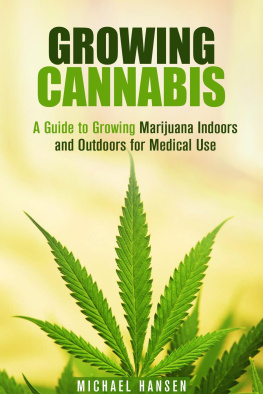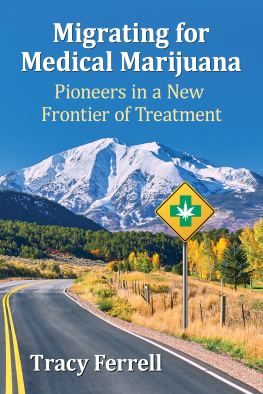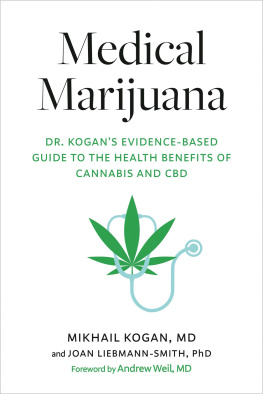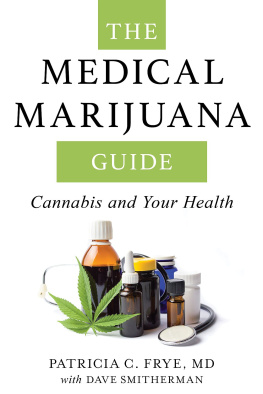Medical
MARIJUANA
101
MEDICAL MARIJUANA 101
Copyright 2011 Mickey Martin and Ed Rosenthal
Third Printing
Published by Quick American Publishing
A division of Quick Trading Co.
Oakland, California
eISBN: 978-1-936807-15-4
Project Managers: Jane Klein and Nick Rosenthal
Cover: Hera Lee
Interior Design and Layout: Alvaro Villanueva
Editing: Eva Saelens
Editorial Advisors: DJ Sun and Mary Lynn Mathre, R.N.
Publishers Cataloging-in-Publication
(Provided by Quality Books, Inc.)
Martin, Mickey, 1974-
Medical marijuana 101 / by Mickey Martin with
Ed Rosenthal, Gregory T. Carter, M.D.
p. cm.
Includes bibliographical references.
1. Marijuana--Therapeutic use. 2. Cannabis--
Therapeutic use.I. Rosenthal, Ed. II. Carter,
Gregory T. III. Title.
RM666.C266M37 2011 615.7827
QBI11-600200
All rights reserved. No part of this book may be reproduced in any form without permission in writing from the publisher, except by a reviewer, who may quote brief passages or reproduce illustrations in a review where appropriate credit is given; nor may any part of this book be reproduced, stored in a retrieval system, or transmitted in any form by any means electronic, photocopying, recording, or other without specific written permission from the publisher.
Medical
MARIJUANA
101
by Mickey Martin
with Ed Rosenthal and Gregory T. Carter, M.D.
QUICK
AMERICAN

CONTENTS
Steph Sherer
by Steph Sherer
Founder and Executive Director
Americans for Safe Access
In 2000, I sustained a severe neck injury that left me with lack of mobility in my neck, neurological spasms, and severe chronic pain. I had to take painkillers, muscle relaxants, and high doses of ibuprofen to relieve the pain and calm the spasms. After about a year, as a result of the medications, problems developed with my stomach and kidneys. Six months later, my doctor warned me that I might have to start dialysis. I was 23 years old and terrified.
One day in the examining room, my doctor shut the door behind him and asked me in a whisper, Do you smoke marijuana? I said no, and he replied, Do you know anyone who does? I thought he was trying to buy marijuana from me! My doctor reassured me that my assumption was wrong. He explained that he did not know very much about medical cannabis, but he had had other patients with similar intolerance to pain medications who were able to cut their medication intake by at least half by using cannabis. He was reluctant to put me on dialysis. If I could find some marijuana, we should try it.
It was the first time that I had ever really thought about marijuana as medicine. I probably had the same amount of information on the subject that most Americans had at the time. I thought medical cannabis was only for people with AIDS or cancer. In favor of it in principle, I knew little about the emerging scientific developments nor had considered the needs of patients. Now facing my own medical crisis, the choice between dialysis and cannabis seemed an easy one to make, regardless of the law.
Finding information about cannabis as medicine was extremely difficult. I started by calling friends and friends of friends, but none of these individuals could explain how to use cannabis as a medicine and why cannabis worked. I felt alone as I started experimenting. It wasnt until months later when I could visit the medical cannabis centers in Californias San Francisco Bay Area that I was able to get the kinds of information found in this book.
Access Means Action
So much has changed over the past years. Resources like this book make learning about cannabis therapeutics and policies easier for patients. But indisputably the battle for safe and legal access to this medication rages on.
The history of medical cannabis in the U.S. is filled with stories of the heroic patients who had laid the foundation of safe access. At the heart of this movement are individuals willing to commit daily acts of federal civil disobedience to provide medicine to people like mea movement of people willing to stand up against injustice, people willing to fight in the courtroom, and people willing to spend their last days concerned about the welfare of others.
I decided to work with other medical cannabis stakeholders to create an organization that would stand up for the rights of people like me who were seeking safe access, as well as the rights of those willing to provide it. As a cannabis patient, it was my turn, my responsibility, and my honor.
In 2002 the opportunity came to found and direct Americans for Safe Access, ASA, the first organization dedicated to safe and legal access to cannabis (marijuana) for therapeutic uses and research.
ASA created a vision for what safe access should look like, and the legal framework to support that vision, through the passing of state and local laws and numerous court battles. Our extensive monitoring of law enforcement activity has helped thousands of patients, and held law enforcement accountable to state laws. We continue to work with members of Congress and the Administration to resolve the federal conflict.
By even considering cannabis as your choice of medicine, you are formulating the future of medical cannabis in your city, state, and nation. My hope is that as you discover the utility of cannabis as a therapeutic in your life, you will also join in to guarantee safe and legal access for everyone who needs it.
Unexpected and unplanned-for ailments arise in life, no matter how healthy a persons lifestyle. Imagine waking in the night to shooting pain and uncontrollable spasms in your legs, only to discover it is the beginning stages of multiple sclerosis (MS). What if you begin to experience severe abdominal pain and your physician diagnoses you with Crohns disease? Alternatively, what if you survive a serious auto accident only to be left with a permanent pain in your legs?
Additionally, less serious but still troublesome health problems become issues for everyone at some point in their lives. Glaucoma, arthritis, migraine headaches, and depression are all examples of extremely common, usually non-life-threatening, health problems that often occur spontaneously and without explanation.
Unfortunately, youre left to choose between feeling better and breaking the law.
Now suppose you realize that the most effective treatment for your disorder is marijuana? Unfortunately, youre left to choose between feeling better and breaking the law. You may have been taught that only degenerates and delinquents use illegal drugs. Now you found an illegal drug that eases your pain and suffering. What will you do? You may be hesitant about trying it for your own condition. After all, it is not available in regular pharmacies and there is so much controversy surrounding it. In addition there may be legal implications.
Medical Marijuana 101 explores the science and history of the marijuana plant and provides a solid foundation to form an educated decision about whether you could benefit from this medicine.
Humans have used marijuana therapeutically for thousands of years.
Humans have used marijuana therapeutically for thousands of years because the herb controls or alleviates a wide variety of medical symptoms. Well explore the science of how marijuana works and its medical uses and effects. Well also examine its history, how its produced and the politics, economics, and legality of marijuana.







